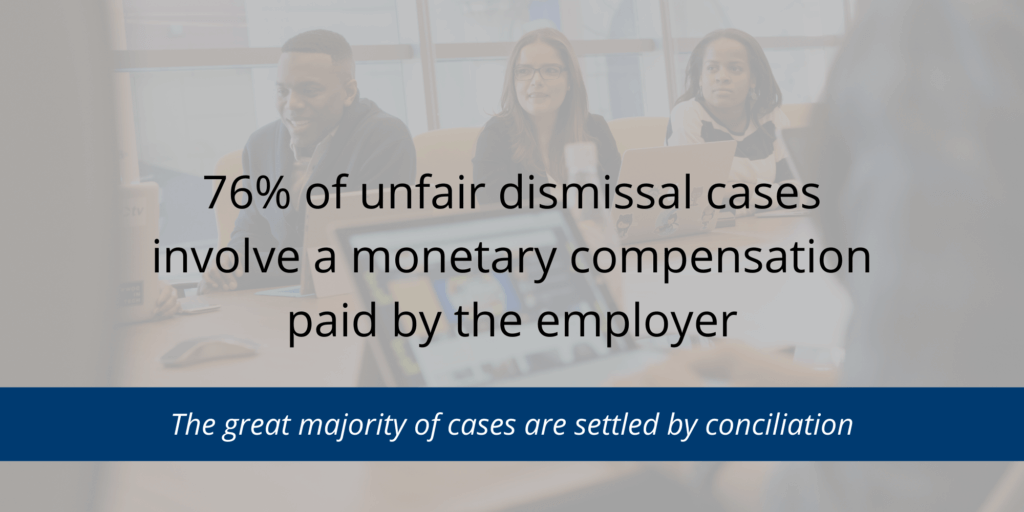In this article we will look at the top 5 “must know facts” about avoiding unfair dismissal cases and what constitutes a harsh, unjust and unreasonable termination.
Firstly, let’s recap on what an “unfair dismissal” is.
The definition of an unfair dismissal is:
- an employee is dismissed from their job in a harsh, unjust or unreasonable manner and / or
- it was not consistent with the Small Business Fair Dismissal Code (in the case of employees of a “small business”)
- it was not a case of genuine redundancy
5 KEY FACTS YOU SHOULD KNOW
- Employees have to apply to the Fair Work Commission within 21 days of the dismissal taking effect – unless they have some exceptional circumstances which prevented them from doing so. The 21-day period starts the day employment finished
- Employees have to be employed for at least 6 months before they can apply for unfair dismissal, unless
- Employees working for a small business (less than 15 employees) have to be employed for at least 12 months before they can apply for unfair dismissal
- Employees can also apply to the Fair Work Commission if they’ve been dismissed on the basis of a breach of their “general protections” rights. More on this in our next article or call us on 1300 55 66 37.
- Procedural fairness is also important in assessing whether a dismissal was unfair
HOW MANY UNFAIR DISMISSAL CASES PER YEAR ARE THERE?
In 2021-22 the Fair Work Commission (FWC) received:
- 34,122 claims applications across all categories
- Unfair dismissal claims were over 38% of these at 13,096

What is termination in a “harsh, unjust or unreasonable manner” in could be an unfair dismissal?
This isn’t straightforward – as one can imagine. Each case is assessed on its merits. Due process is very important in assessing fairness and in determining an application for unfair dismissal. An employer is strongly advised to follow the processes noted below. In considering whether a dismissal was harsh, unjust or unreasonable, the Fair Work Commission must take into account:
- whether there was a valid reason for the dismissal related to the person’s capacity or conduct (including its effect on the safety and welfare of other employees)
- whether the person was notified of that reason
- whether the person was given an opportunity to respond to any reason related to their capacity or conduct
- any unreasonable refusal by the employer to allow the person to have a support person present to assist at any discussions relating to their dismissal
- if the dismissal related to unsatisfactory performance by the person — whether the person had been warned about that unsatisfactory performance before the dismissal
Employers should note that there have been cases where the reason for termination has been held to be valid but because the process by which the employer went about the termination was unfair, the dismissal was found to be harsh & and/or unjust.
What is a Genuine Redundancy?
An unfair dismissal application cannot be made if the dismissal was a case of genuine redundancy. A dismissal is a case of genuine redundancy when:
- the employer no longer requires the person’s job to be performed by anyone because of changes in the operational requirements of the employer’s enterprise, AND
- the employer has complied with any obligation imposed by an applicable modern award or enterprise agreement to consult about the redundancy.
A dismissal is NOT a case of genuine redundancy if it would have been reasonable in all of the circumstances to redeploy the person within:
- the employer’s enterprise, or
- the enterprise of an associated entity of the employer.
–> DON’T USE REDUNDANCY AS A QUICK FIX FOR UNDER PERFORMING EMPLOYEES <–
There is temptation in cases of under performing workers to use “redundancy” as a way to terminate the employee to just pay them out and terminate the employment. As you can see from the above, this may not protect you from an unfair dismissal case – because the redundancy can be challenged as not being genuine. Employers are better off managing the employee’s performance and following the procedures than going for a quick win pay off that may come back to bite you. And it will often cost you a lot more going down this path.
When to Use Warnings
Warnings become relevant when an employee is dismissed for unsatisfactory performance.
Performance includes factors such as diligence, quality of work, care taken, and adherence to important policies and procedures. The Commission must take into account the period of time between an employee being warned about unsatisfactory performance, and a subsequent dismissal. This period of time gives the employee the opportunity to understand their employment is at risk and to try and improve their performance.
Employers should have established processes for dealing with under-performance and should initially approach any cases with the objective of improving performance. A process such as the following is suggested:
The first step is that the manager needs to investigate the matter and articulate what exactly is the performance problem and communicate this to the employee.
The second step may well be informal coaching with the employee – explaining performance gaps and providing guidance on what improvements can be made.
If the employee fails to take on the feedback and/or still does not meet the required standard of performance provided a reasonable amount of time is given (this depends on the nature of the performance gap), a Performance Improvement Plan may be implemented. Throughout this and each stage, everything should be documented, and file noted. If there is continued under-performance after the informal coaching, then a performance improvement plan should be implemented – ideally with the employee’s input. In the plan it should include a final review date (i.e. 4 weeks, 6 weeks or 8 weeks later). Put the employee on notice that if he/she still fails to improve their performance by the end date, further disciplinary actions may be taken and that may include termination.
If termination of employment appears to be the likely outcome after this process, it is highly recommended you contact ER Strategies for advice and to minimise your risks of facing an unfair dismissal claim.
Unfair dismissals in Small Businesses – What are the Rules?
Small employers are reminded that the definition of small employer is ‘fewer than 15 employees on a simple headcount’. Employees of small employers need to be employed for at least 12 months before they can take an unfair dismissal action.
Also, small businesses have different rules for dismissal. The Small Business Fair Dismissal Code provides protection against unfair dismissal claims, where an employer follows the Code. The Fair Work Commission should deem a dismissal to be fair if the employer follows the Code and can provide evidence of this. The following provides further explanation of what is required.
- Summary Dismissal
It is fair for an employer to dismiss an employee without notice or warning when the employer believes on reasonable grounds that the employee’s conduct is sufficiently serious to justify immediate dismissal. Serious misconduct includes theft, fraud, violence and serious breaches of occupational health and safety procedures
- Other Dismissals
In other cases, the small business employer must:
- Give the employee a reason why he or she is at risk of being dismissed. The reason must be a valid reason based on the employee’s conduct or capacity to do the job.
- Warn the employee verbally or preferably in writing, that he or she risks being dismissed if there is no improvement
- Provide the employee with an opportunity to respond to the warning
- Give the employee a reasonable chance to rectify the problem, having regard to the employee’s response.
Rectifying the problem might involve the employer providing additional training and ensuring the employee knows the employer’s job expectations.
- Procedural Matters are Important
In discussions with an employee in circumstances where dismissal is possible, the employee can ask to have another person present to assist. However, the other person should not be a lawyer acting in a professional capacity.
A small business employer will be required to provide evidence of compliance with the Code if the employee makes a claim for unfair dismissal to Fair Work Australia, including evidence that a warning has been given (except in cases of summary dismissal).


